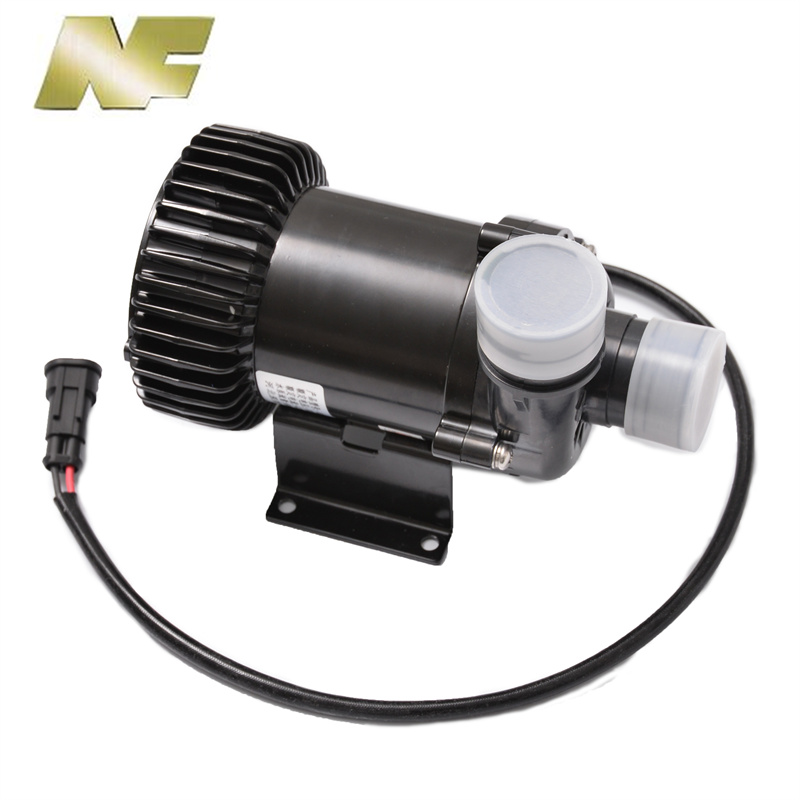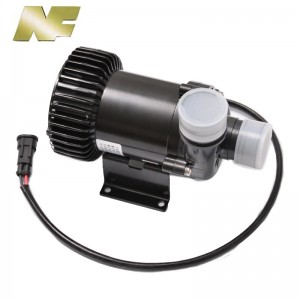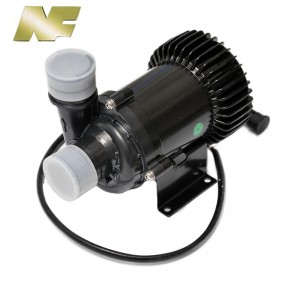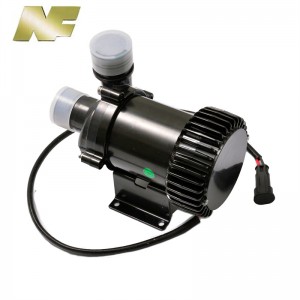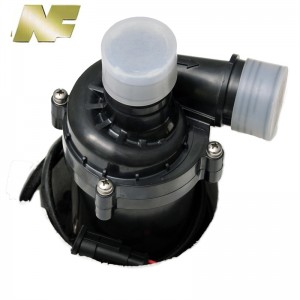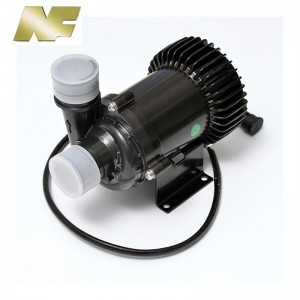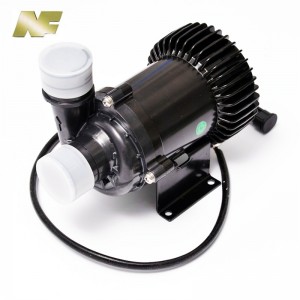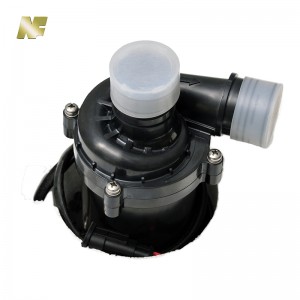Electric Vehicle Coolant Pump Circulation Pump
Description
Electric bus water pump:
The water pumps on electric buses are designed to cool the electric motors that power the vehicles. Unlike conventional internal combustion engines, electric motors generate a lot of heat due to the current flowing through their windings. To prevent overheating and ensure optimum performance and longevity, a reliable cooling system with efficient water pumps is imperative.
These water pumps circulate the coolant through the electric motor, which absorbs heat and transfers it to the radiator. Here, heat is dissipated into the atmosphere, keeping the motor within the ideal temperature range. Without an effective cooling system, electric bus motors can easily overheat, resulting in reduced performance and potential damage to critical components.
Technical Parameter
|
Ambient temperature
|
-50~+125ºC
|
|
Rated Voltage
|
DC24V |
|
Voltage Range
|
DC18V~DC32V |
|
Waterproofing Grade
|
IP68 |
|
Current
|
≤10A
|
|
Noise
|
≤60dB
|
|
Flowing
|
Q≥6000L/H (when the head is 6m)
|
|
Service life
|
≥20000h
|
|
Pump life
|
≥20000 hours
|
Advantage
Automotive Cooling Pumps in Hybrid Electric Vehicles:
Hybrid electric vehicles, on the other hand, employ both an internal combustion engine and an electric motor. The cooling system in a hybrid vehicle serves a dual purpose: to cool the internal combustion engine, and to cool the electric motor and related components.
In hybrid vehicles, the water pump plays a vital role in maintaining the optimum operating temperature of the engine. This is critical for engine efficiency, emission control and extending the life of the engine. The coolant absorbs excess heat generated by the engine and sends it to the radiator, where it cools and then circulates.
Additionally, in HEVs, the water pump also serves to cool the electric motor and other power electronics. By ensuring that electrical components are properly cooled, a water pump helps optimize its efficiency and overall performance.
The future of pump technology:
Advances in water pump technology are becoming increasingly important as the demand for electric and hybrid electric vehicles continues to grow. Engineers are continually working to improve the efficiency and durability of water pumps to meet the unique demands of these modern vehicles.
The development of electric water pumps is especially noteworthy because these pumps eliminate the need for engine-driven accessories. By reducing overall energy consumption, electric water pumps help improve the efficiency and sustainability of electric and hybrid electric vehicles.
In conclusion:
Water pumps for electric buses and hybrid electric vehicles are an important component in the move towards greener transportation. They play a key role in cooling critical components, ensuring peak performance and extending the life of vital electric and combustion engine systems. As technology advances, water pump efficiency and sustainability will continue to play an important role in the advancement of electric and hybrid vehicle designs.
FAQ
Q: What is a car electric water pump for buses?
Answer: The passenger car electric water pump is a device used to circulate the coolant in the passenger car engine cooling system. It runs on an electric motor, which helps keep the engine at an optimum temperature.
Q: How does the car electric water pump work?
A: The car's electric water pump is connected to the engine's cooling system and is powered by the vehicle's electrical system. After starting, the electric motor drives the impeller to circulate the coolant to ensure that the coolant flows through the radiator and engine block to effectively dissipate heat and prevent overheating.
Q: Why are electric water pumps for cars important for buses?
A: An automotive electric water pump is critical for buses as it helps maintain proper engine temperature, which is critical for reliable and efficient performance. It prevents the engine from overheating, reduces the risk of engine damage and ensures the longevity of the vehicle.
Q: Does the car's electric water pump show signs of trouble?
A: Yes, some common signs of a car electric water pump failure include engine overheating, coolant leaks, unusual noise from the pump, and obvious damage or corrosion to the pump itself. If you notice any of these symptoms, it is recommended to have the pump checked and replaced if necessary.
Q: How long can a car electric water pump usually last?
Answer: The service life of the electric water pump of the car will vary due to factors such as the use, maintenance and quality of the water pump. On average, a well-maintained pump will last 50,000 to 100,000 miles or more. However, regular inspection and replacement (if necessary) is essential to ensure optimum performance.
Q: Can I install a car electric water pump on the bus myself?
A: While it is technically possible to install an automotive electric water pump on a bus yourself, it is highly recommended to seek professional help. Proper installation is critical to pump performance and life, and professional mechanics have the expertise and tools needed for a successful installation.
Q: How much does it cost to replace the car's electric water pump with a bus?
A: The cost of replacing an automotive electric water pump for a bus can vary depending on the make and model of the vehicle and the quality of the pump. On average, the cost ranges from $200 to $500, including the pump itself and installation labor.
Q: Can I use a manual water pump instead of an automatic electric water pump?
A: In most cases, it is not recommended to replace an automatic electric water pump with a manual water pump. The automatic electric water pump runs more efficiently, is easier to control, and provides better cooling. Additionally, modern passenger car engines are designed to work with the car's electric water pump, replacing it with a manual water pump could compromise engine performance.
Q: Are there any maintenance tips for car electric water pumps?
A: Yes, some maintenance tips for your car's electric water pump include regularly checking the coolant level, checking for leaks or damage, ensuring proper tension and alignment of the pump belt, and following the manufacturer's recommended maintenance schedule. Also, it is important to replace the pump and other cooling system components at specified intervals to avoid any potential problems.
Q: Will the failure of the car's electric water pump affect other parts of the engine?
A: Yes, a car electric water pump failure can have a major impact on other engine components. If the pump isn't circulating the coolant properly, it can cause the engine to overheat, which can lead to damage to the cylinder head, gaskets, and other critical engine components. That's why it's crucial to fix water pump problems promptly to prevent further damage.

